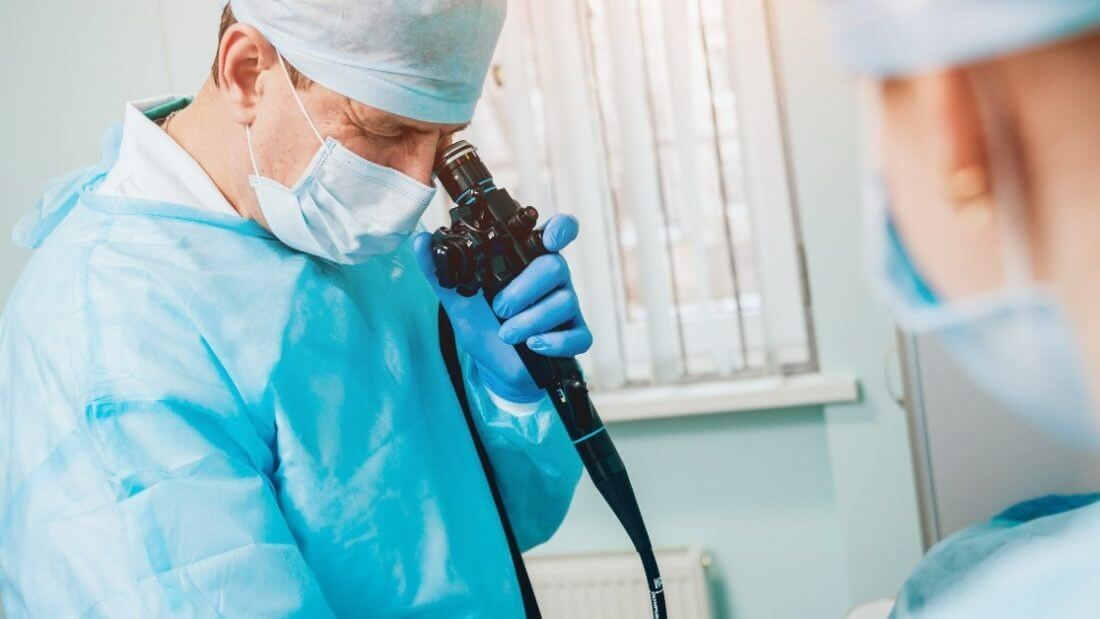Do you have undiagnosed abdominal pain or gastrointestinal (GI) concerns? An endoscopic procedure can be a minimally invasive solution to assess the GI concerns you may be having. Our gastrointestinal doctors in San Antonio, TX perform endoscopic services to observe the various areas of the digestive tract. Such options help reduce the need for more invasive procedures and extended recovery periods.
An endoscopy is a type of procedure that aids in the diagnosis of diseases located in the esophagus, abdomen, and stomach. One of the most common endoscopic services is a colonoscopy, which is integral in catching and preventing colorectal cancer.
What are the main differences between a colonoscopy vs. an endoscopy, and how can endoscopic procedures help you? Continue reading for further details on these services at San Antonio Gastroenterology Associates. Our GI team strives to ensure patients in and around the San Antonio, TX area receive the treatment needed for gastrointestinal health.
What are the main differences between colonoscopies and endoscopies?
Though an endoscope (a long, thin, and bendable device fitted with a camera and light) is utilized to obtain high-resolution pictures for both endoscopies and colonoscopies, there are a few primary differences that separate these processes.
In cases where the upper area of the digestive system must be assessed, an upper endoscopy procedure may be ordered. With this option, the endoscope is placed in your mouth and gently moved down your throat into the esophagus, stomach, and small intestine. In comparison, a colonoscopy is performed when the lower part of the gastrointestinal tract needs to be assessed. During a colonoscopy, the endoscope device is inserted into the rectum and moved up into the large intestine (colon).
Another difference is how you prepare for endoscopies vs. colonoscopies. With a colonoscopy exam, you’ll likely be allowed to only consume clear liquids for 24 hours beforehand. Instructions on how to clear your GI system of stool will be given and may involve the use of laxatives or cleansing solutions. This clears the way for easy visualization of the rectum and colon.
The preparation process for an upper endoscopy is less intensive. It’s important to avoid consuming any food and beverages for about six hours prior to the procedure and cease taking certain blood-thinning medications as recommended by your physician. If you’d like to learn more about the differences between colonoscopies vs. endoscopies, set up a visit with our San Antonio Gastroenterology Associates team to have your questions answered.
How is an endoscopy conducted?
To conduct an endoscopy procedure, a flexible, slender tube (endoscope) is positioned into the mouth and gently advanced down the throat and esophagus and into the small bowel. If necessary, special tools can be connected to the endoscope device to help provide solutions for a number of ailments. Such tools can be utilized to extract tissue samples, retrieve food caught in the upper GI tract, or open a stricture (narrowed area).
The reasons for requiring an endoscopy can vary. If you develop symptoms that impact your quality of life, one of our endoscopy specialists in San Antonio, TX might recommend this type of exam. It can help our team identify the ideal treatment option for your needs. Generally speaking, an endoscopy procedure can be ideal if you experience:
- Long-term heartburn or chest pain
- Bloody stool
- Unexplained abdominal discomfort
- Constant bowel changes (like constipation or diarrhea)
How does a colonoscopy work?
During a colonoscopy screening, an endoscope is carefully placed within the rectum and advanced into the colon. The scope transmits real-time video images to a monitor where your doctor can assess the large intestine. During the course of the exam, biopsies of the tissue can be taken to detect whether cancer cells are present, and precancerous polyps (growths) can be excised.
It’s imperative to have a colonoscopy screening if you have a family history of colon cancer or when you turn 45. Colonoscopies might also be performed if you notice the following signs or symptoms regularly:
- Abdominal cramping
- Narrow or thin stools
- Bloody stools
- Anal bleeding
- Unintended weight loss
- Bloating
- Change in bowel movements
- Chronic fatigue
Experience relief from GI symptoms with endoscopic procedures
An endoscopic approach can allow your healthcare practitioner to detect and address concerns like blockages within the intestines, growths, unexplained abdominal pain, and more. When you partner with the team at San Antonio Gastroenterology Associates, experienced care for your GI health is close at hand. We are ready to help you find relief from digestive issues and bowel conditions. Get in touch with our digestive health team in San Antonio, TX today to arrange for a treatment consultation.

